
Introduction
Losing one or more teeth can have a significant impact on your daily life, affecting your ability to eat, speak, and even smile with confidence. Thankfully, there are a variety of tooth replacement options available to help restore your smile, including all-on-4 dental implants and dentures. While both options can be effective, they are quite different in terms of function, appearance, maintenance, and cost. In this article, we will discuss the differences between all-on-4 dental implants and dentures, so you can better understand which option may be right for you. We will cover how the all-on-4 procedure works, the benefits it offers, the types of dentures, and the factors that you should consider when choosing between the two options. Whether you’re missing a few teeth or a full arch, understanding the differences between all-on-4 dental implants and dentures can help you make an informed decision about your tooth replacement options.
Key Takeaway
- All-on-four implants are a type of implant that involves surgically placing four dental implant posts in the jawbone to support a full arch of replacement teeth. They provide a more permanent solution than dentures, with improved functionality, natural look and feel, improved speech and eating, and require less maintenance.
- Dentures are removable prosthetic teeth that sit on top of the gums and have been used for many years as a solution for missing or damaged teeth. They come in different types and require periodic adjustments, relining, and replacement over time.
- Candidates for all-on-4 dental implants should have enough jawbone density, good overall health, and be free of any conditions that could complicate the implant surgery or healing process. A qualified dental professional can determine if all-on-4 dental implants are the right choice for you.
- The cost of an all-on-4 dental implant procedure can vary depending on factors such as the number of implant posts needed, the location of the practice, and the type of replacement teeth. While it can be an investment, all-on-4 dental implant treatment can last for many years with proper care.
- It’s important to consider the overall health, jawbone density, number and location of missing teeth, and lifestyle when choosing between all-on-4 dental implants and complete dentures. It’s important to consult with a qualified implant dentist to determine which option is best for you.
Definition and explanation of all-on-4 dental implants
Description of all-on-4 procedure
All-on-4 dental implants are a type of implant that involves surgically placing four dental implant posts in the jawbone to support a full arch of teeth. Unlike traditional implant surgery, which typically requires one implant post for each missing tooth, the all-on-4 technique utilizes just four implant posts, even for a full arch of missing teeth. The procedure starts with an initial consultation with a qualified dental professional such as an oral surgeon, periodontist, or general dentist. They will take x-rays, do a thorough examination of the mouth and discuss your goals and expectations.
The implant posts are placed in strategic locations in the jawbone, and a temporary set of replacement teeth is attached to the implant posts immediately after the surgery, allowing you to have a fully functional set of teeth right away. Once the implant procedure posts have fully fused with the jawbone and the surrounding tissue, typically after a few months, a permanent set of replacement teeth is attached to the implant posts. These replacement teeth are designed to look and function like natural teeth, allowing you to eat, speak, and smile with confidence.
Benefits of all-on-4 implants
All-on-4 dental implants provide a more permanent solution than dentures, as the implant posts are designed to fuse with the jawbone and provide a stable foundation for the replacement teeth.
- They mimic the look and feel of natural teeth, providing a more natural appearance and improving self-confidence.
- The All-on-4 technique improves the functionality of the replacement teeth, you will be able to eat and speak with ease.
- The implant-supported replacement teeth won’t slip, slide or rub like traditional dentures can, providing a more comfortable fit.
- All-on-4 treatments don’t require as much maintenance as dentures, and they are designed to last for many years.
- The All-on-4 technique is a cost-effective solution, requiring fewer implants than traditional implant dentistry.
- The procedure is also less invasive than traditional implant dentistry, requiring fewer incisions and less bone grafting.
Overall, All-on-4 dental implants provide a more permanent, comfortable, and cost-effective solution than traditional dentures.
Description of dentures
Types of dentures
- Full Dentures: replace a full arch of missing teeth, and are held in place by suction or a mild adhesive
- Partial Dentures: replace one or more missing teeth and typically use metal clasps or precision attachments to attach to remaining natural teeth
- Implant Supported Dentures: use dental implant post to provide a stable foundation for the replacement teeth. They can be removable or fixed in place.
Benefits of dentures
- Dentures can help restore the ability to eat, speak and smile with confidence.
- Traditional dentures have been used for many years, and are a well-established tooth replacement solution
- They can be a more affordable option than other tooth replacement options, such as all-on-4 dental implants.
- They allow those missing all or most of their teeth to have a full set of teeth again, improving self-esteem and confidence.
- Partial dentures are useful for filling spaces caused by missing teeth and help preserve the remaining natural teeth and jaw structure.
Comparison of all-on-4 dental implants and dentures
Functionality
All-on-4 treatments provide a more natural biting and chewing function than dentures, as they are securely anchored to the jawbone and provide a stable base for replacement teeth. Dentures, on the other hand, rest on the gums and can slip or move during eating or speaking, affecting functionality.
Appearance
All-on-4 dental implants mimic the look and feel of natural teeth and offer a more natural appearance than dentures. Dentures, while they can be designed to mimic natural teeth, may not look as real tooth as all-on-4 dental implants, and can often have an artificial teeth appearance.
Maintenance
All-on-4 dental implants require less maintenance than dentures, which may need relining, adjustments, and replacement over time. Regular dental check-ups and proper oral health hygiene are important for all-on-4 dental implants, but it’s more straightforward than for dentures. Temporary dentures also require daily cleaning and soaking and may require frequent repairs, click here to learn more.
Cost
The cost of all-on-4 dental implant treatment can vary depending on factors such as the number of implant posts needed, the location of the practice, and the type of replacement teeth. Dentures are often considered a more affordable option than all-on-4 implant treatment, but they may require additional costs for maintenance and replacement over time. It’s important to consult a qualified dental professional to understand the cost breakdown and the long-term value of each option.
Factors to Consider When Choosing Between All-on-4 Implants and Dentures
Overall health
A person’s overall health plays a crucial role in determining whether all-on-4 replacement teeth are a good option. Certain health conditions, such as diabetes or osteoporosis, can affect the healing process and make implant surgery more complicated.
Jawbone density
All-on-4 dental implants rely on the jawbone to provide a stable foundation for the replacement teeth. If a person has insufficient jaw bone structure and bone density, a bone grafting procedure may be necessary before the all-on-4™ surgery.
Number and location of missing teeth
The number and location of missing teeth can also play a role in determining whether all-on-4 dental implants are a good option. All-on-4 total smile treatment may be more suitable for a full arch of missing teeth, whereas partial dentures may be a better choice for one or a few missing teeth.
Lifestyle
A person’s lifestyle should also be considered when choosing between all-on-4 dental implants and dentures. All-on-4 dental implants provide a more permanent solution and require less maintenance, which may be more suitable for someone with an active lifestyle. Dentures, on the other hand, can be removed and are considered a more traditional solution, which may be better for someone with a more sedentary lifestyle.
What are all-on-4 dental implants?
All-on-4 dental implants are a type of implant that involves surgically placing four dental implant posts in the jawbone to support a full arch of replacement teeth. They provide a more permanent and natural-looking solution than traditional dentures.
How do all-on-4 dental implants differ from dentures?
All-on-4 dental implants are a more permanent solution and mimic the look and feel of natural teeth. They are securely anchored to the jawbone and provide a stable base for replacement teeth. Dentures, on the other hand, rest on the gums and can slip or move during eating or speaking, affecting functionality. Dentures also require more maintenance than all-on-4 dental implants.
Am I a good candidate for all-on-4 dental implants?
The best way to determine if all-on-four dental implants are the right choice for you is to consult with a qualified dental professional. They will take x-rays, do a thorough examination of the mouth and evaluate factors such as your overall health, jawbone density, and number and location of missing teeth.
What are the prices of all-on-4 dental implants?
The number of implant posts required, the practice’s location, and the kind of replacement teeth can all affect the cost of an all-on-four procedure. To comprehend the cost breakdown and the long-term worth of the treatment, it is crucial to speak with a skilled dental practitioner.
Are all-on-4 dental implants a better option than dentures?
All-on-4 dental implants can be a better option than dentures for some people, depending on factors such as overall health, jawbone density, number and location of missing teeth, and lifestyle. It’s important to consult a dentist to determine which option is best for you. All-on-4 dental implants are a permanent denture solution that can provide a more natural look and feel than dentures. They also don’t require the same level of maintenance as dentures, which need to be removed and cleaned daily. Additionally, All-on-4 dental implants can help preserve the jawbone, which can help prevent further tooth loss. However, All-on-4 dental implants are more expensive than dentures and require a longer recovery time. Ultimately, the decision of which option is best for you should be made with the help of your dentist.
Conclusion
All-on-4 dental implants and dentures are two common tooth replacement options, but they differ in terms of permanency, functionality, appearance, maintenance, and cost. All-on-4 dental implants provide a more permanent, natural-looking, and functional solution, whereas removable dentures require more maintenance. Factors such as overall health, jawbone density, number and location of missing teeth, and lifestyle should be considered when choosing between the two options.
Encouragement for people considering tooth replacement options to consult a dentist and learn more about all-on-4 dental implants If you are considering a tooth replacement option, it’s important to consult a qualified dental professional. They can assess your individual needs, evaluate your jawbone density, and determine if all-on-4 dental implants are the right choice for you. They can also provide information about the procedure, recovery time, cost, and potential risks.





